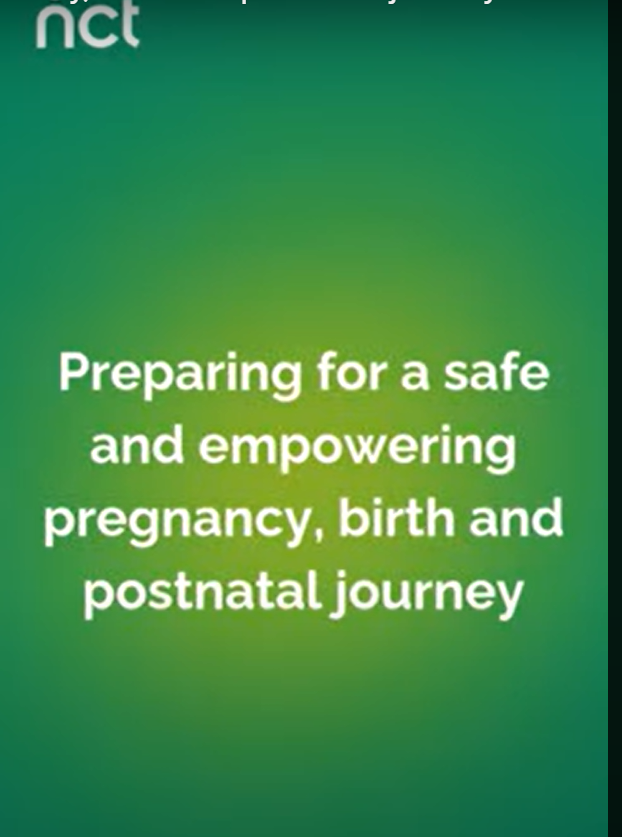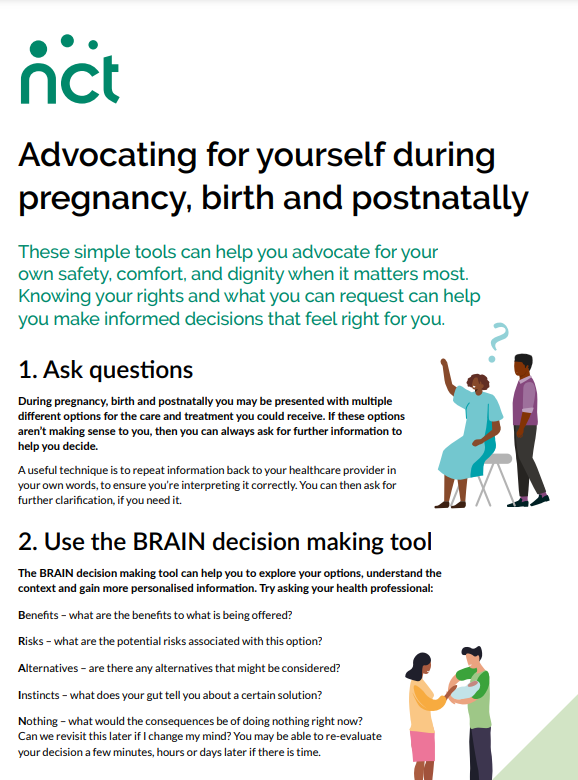Released on: 18 October 2024
To support parents and empower them to have a more confident antenatal and birth experience, NCT has issued a new ‘advocacy checklist’.
The checklist is in response to concerns over safety, maternity staffing levels, and care providers failing to listen to women, pregnant people, and parents. Last month, the Care Quality Commission’s (CQC) report based on inspections of 131 maternity units in England found that 65% of maternity units are not safe for women to give birth in, with 47% of hospital trusts rated as requiring improvement on safety and another 18% rated as inadequate.
“We want all pregnant women, people, and birth partners to know their rights, understand what they can request, and feel empowered – but the reality is that many maternity settings are failing to keep them safe,” says Katherine Walker at NCT. “This checklist isn’t just about preparing parents for childbirth; it’s about giving them the tools to advocate for their own safety, comfort, and dignity when it matters most."
“We want every new parent to feel as confident and prepared as they can be when going into childbirth and understand that their voice is the most important in the room."
“To support parents during what may be a daunting and unfamiliar scenario, we’re sharing an important checklist of things to be aware of, to help ensure pregnant women, people, and their birth partners feel empowered, listened to, and supported during this important moment in their lives.”
1. Ask questions
“During pregnancy and birth, you will be presented with multiple, different options for things like monitoring, examinations, pain management, birth interventions, and more. If these options aren’t making sense to you, or you don’t feel like you have enough information to decide, then ask for further information."
“A useful technique is to repeat information back to the healthcare professional in your own words, to ensure you’re interpreting the information correctly. From here, you should all be on the same page and be able to challenge or ask for further information if you need it."
“If you feel that you are not being listened to, are not happy with the options, or you do not feel comfortable with a particular member of staff, you can request to speak to someone else. You can also ask to speak to the person in charge to explain the challenges you may be experiencing and explore the options available to you. Offering this feedback directly to the healthcare professional calmly and clearly can also have positive outcomes.”
2. Use the BRAIN decision-making tool
“Having as much information as you need, which might include talking to different people and looking at different sources of information, can help expectant parents explore and navigate uncertainty."
“We recommend using the BRAIN decision-making tool, which helps pregnant women, people, and their partners explore their options more thoroughly with health professionals:
- Benefits – what are the benefits of the option that’s been offered?
- Risks – what are the potential risks associated with this option?
- Alternatives – are there any alternatives that might be considered?
- Instincts – what does your gut tell you about a certain option?
- Nothing – what would the consequences be of doing nothing right now? Can we revisit this later if I change my mind? You may be able to re-evaluate your decision in a few minutes, hours or days, if there is time.
3. Knowing your rights
“While receiving clinical care or being in a hospital environment may feel unfamiliar and a little daunting, it’s important to remember that you are the ultimate decision maker."
“You must consent to any decision being made, and you also have the right to decline."
“You have the right to request a different midwife, obstetrician, or care provider at any point during your pregnancy, labour, birth, and postnatal journey. You can even change hospitals if needed."
“Similarly, if at any point you feel unsafe or that your physical or mental wellbeing is at risk, you can make this known and outline the changes you would like, to resolve the situation. You also have the right to request to speak to someone privately."
4. Birth partners can be an advocate, too
“Birth partners, doulas, parents, and friends can be powerful advocates, amplifying your voice, particularly if English isn’t your first language."
“This can include reinforcing questions that have been asked or checking in with you to ask how you feel, or if you have any further questions. This can help you feel empowered and listened to.”
We have created this checklist to help you advocate for yourself during pregnancy, birth, and early parenthood. The NHS has a responsibility to keep you safe during your maternity journey, and we want to help you feel confident that you're seen. We also have this easy to follow video below that might help you feel more confident in asking questions, and understand your rights as a pregnant woman, person, or birthing partner.
You can view the full advocacy during pregnancy and birth toolkit by clicking the image below.
For more information and support during pregnancy, birth and postnatally please click here.
NCT is the national charity for pregnancy, birth, infant feeding, and early parenthood, and each year we support over 250,000 parents on their unique journeys. For free, evidence-based information on pregnancy, birth and early parenthood visit www.nct.org.uk As the UK’s leading antenatal education provider, NCT Antenatal courses provide practical skills and knowledge and help create support networks so that expectant parents feel confident and ready for life with a new baby. NCT also campaigns on the issues that matter most to parents, to make NHS maternity services better.





